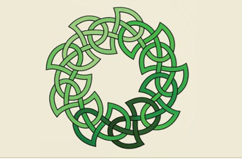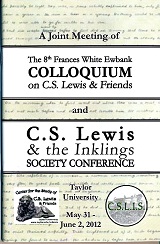Event Title
Academic Paper Session 2-A
Location
Rupp 203
Start Date
1-6-2012 10:30 AM
Description
"C.S. Lewis and a Return to the Great Books" - Martin Batts
In our present day, reasoned and informed thinking and a sense of the past seem to have fallen on hard times. In an almost prophetic way, C.S. Lewis in his book, The Abolition of Man, seems to have foreseen that if modern man continues to treat himself as a natural object cut off from the past and attempts to make value judgments based simply on natural impulses, then man himself will be viewed as simply a product of nature and, man as man, will be abolished.
If Lewis is correct about this trend concerning modern man and his being cut off from the past, what can be done to revers the situation?
What Lewis is calling for by admonition and by example is a deeper understanding of the past and a return to the classics, or great books, in order to better understand our present and to prepare ourselves for the future.
"A Prisoner's Duty: The Sacred Role of Reading in the Christian Life" - John Stanifer
Just how important is reading to the Christian life? Most of us are willing to assert that the Scriptures are an important part of our reading diet, but what about classic literature or popular fiction? Reading anything and everything we can get our hands on is not so far from the formula followed by some of the most influential figures in Judeo-Christian history, from C.S> Lewis and J.R.R. Tolkien to Daniel and Paul the Apostle. By the end of this presentation, our goal will be to gain a closer understanding of the sacred role of all reading in the Christian life.
"C.S. Lewis' Reading of George MacDonald" - William Vaus
Scholars have been trying to answer for decades: "What has made C. S. Lewis such a great writer with so large a following?" One answer to that question which has yet to be fully explored is Lewis' vast and deep reading across the entire canon of Western literature, from Homer and the Bible down to some of the most important works of the early twentieth century. It seems to me self-evident that before one can become a great writer one must be a great reader. Most certainly C. S. Lewis was a voracious consumer of books.
In 1962, The Christian Century magazine asked Lewis: "What books did most to shape your vocational attitude and your philosophy of life?" In response, he offered a list of ten books and at the top of that list was Phantastes by George MacDonald. However, as all serious readers of Lewis know, Lewis was influenced by more than just one book by MacDonald. In this paper, I will provide a brief survey of Lewis' reading of MacDonald with attention given to how MacDonald and his works influenced Lewis.
Event Type
Paper
Link to Papers
C.S. Lewis and a Return to the Great Books (Not available)
A Prisoner's Duty: The Sacred Role of Reading in the Christian Life
C.S. Lewis' Reading of George MacDonald (Not available)
Academic Paper Session 2-A
Rupp 203
"C.S. Lewis and a Return to the Great Books" - Martin Batts
In our present day, reasoned and informed thinking and a sense of the past seem to have fallen on hard times. In an almost prophetic way, C.S. Lewis in his book, The Abolition of Man, seems to have foreseen that if modern man continues to treat himself as a natural object cut off from the past and attempts to make value judgments based simply on natural impulses, then man himself will be viewed as simply a product of nature and, man as man, will be abolished.
If Lewis is correct about this trend concerning modern man and his being cut off from the past, what can be done to revers the situation?
What Lewis is calling for by admonition and by example is a deeper understanding of the past and a return to the classics, or great books, in order to better understand our present and to prepare ourselves for the future.
"A Prisoner's Duty: The Sacred Role of Reading in the Christian Life" - John Stanifer
Just how important is reading to the Christian life? Most of us are willing to assert that the Scriptures are an important part of our reading diet, but what about classic literature or popular fiction? Reading anything and everything we can get our hands on is not so far from the formula followed by some of the most influential figures in Judeo-Christian history, from C.S> Lewis and J.R.R. Tolkien to Daniel and Paul the Apostle. By the end of this presentation, our goal will be to gain a closer understanding of the sacred role of all reading in the Christian life.
"C.S. Lewis' Reading of George MacDonald" - William Vaus
Scholars have been trying to answer for decades: "What has made C. S. Lewis such a great writer with so large a following?" One answer to that question which has yet to be fully explored is Lewis' vast and deep reading across the entire canon of Western literature, from Homer and the Bible down to some of the most important works of the early twentieth century. It seems to me self-evident that before one can become a great writer one must be a great reader. Most certainly C. S. Lewis was a voracious consumer of books.
In 1962, The Christian Century magazine asked Lewis: "What books did most to shape your vocational attitude and your philosophy of life?" In response, he offered a list of ten books and at the top of that list was Phantastes by George MacDonald. However, as all serious readers of Lewis know, Lewis was influenced by more than just one book by MacDonald. In this paper, I will provide a brief survey of Lewis' reading of MacDonald with attention given to how MacDonald and his works influenced Lewis.


